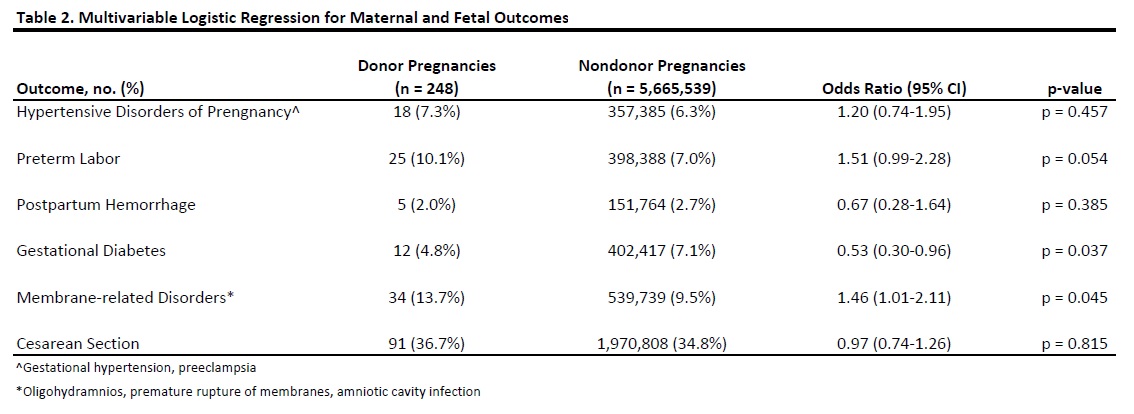Maternal and Pregnancy Outcomes after Living Donor Nephrectomy in a Multistate Cohort
1Surgery, Hospital of the University of Pennsylvania, Philadelphia, PA, 2Sidney Kimmel Medical College, Philadelphia, PA, 3Surgery, Rutgers Robert Wood Johnson, New Brunswick, NJ, 4Medicine, Hospital of the University of Pennsylvania, Philadelphia, PA
Meeting: 2019 American Transplant Congress
Abstract number: 445
Session Information
Session Name: Concurrent Session: Kidney Living Donor: Long Term Outcomes
Session Type: Concurrent Session
Date: Tuesday, June 4, 2019
Session Time: 2:30pm-4:00pm
 Presentation Time: 2:30pm-2:42pm
Presentation Time: 2:30pm-2:42pm
Location: Room 304
*Purpose: Studies have demonstrated increased risk of preeclampsia for pregnancies after kidney donation in homogenous populations or single-center studies. Our study aims to delineate maternal and pregnancy outcomes from a multistate heterogeneous population of former living kidney donors.
*Methods: We performed a retrospective cohort study of individuals and their hospitalizations using the Healthcare Cost and Utilization Project State Inpatient Databases for California (2005-2011), Florida (2005-2014), and New York (2010-2013). We used a multivariable logistic regression model to compare outcomes of pregnancies from former donors to all other pregnancies in the same time period.
*Results: Of 5,665,787 pregnancies in the study period, 248 were attributable to former kidney donors. The median age at pregnancy for donors was 31 years (27-34) and 10.9% were black. The median age at pregnancy for nondonors was 28 years (23-33) and 13.9% were black. The median number of comorbidities for both groups was 0 (0-0). Donors had an increased risk of membrane-related disorders such as oligohydramnios and premature rupture of membranes (OR 1.48, 1.01-2.11, p=0.045) and a decreased risk of gestational diabetes (OR 0.53, 0.30-0.96, p=0.037). There was no difference in risk for hypertensive disorders of pregnancy, preterm labor, post-partum hemorrhage, or cesarean section.
*Conclusions: Additional differences in maternal and pregnancy outcomes may exist between heterogeneous groups of kidney donors and the general population. Future research should assess risk against matched controls to elucidate the impact of kidney donation on women of child-bearing age.
To cite this abstract in AMA style:
Lee GS, Wang RX, Walls DO, Reese PP, Goldberg DS, Abt PL. Maternal and Pregnancy Outcomes after Living Donor Nephrectomy in a Multistate Cohort [abstract]. Am J Transplant. 2019; 19 (suppl 3). https://atcmeetingabstracts.com/abstract/maternal-and-pregnancy-outcomes-after-living-donor-nephrectomy-in-a-multistate-cohort/. Accessed February 21, 2026.« Back to 2019 American Transplant Congress


